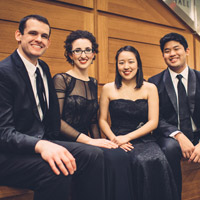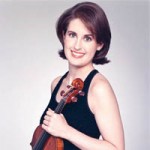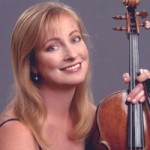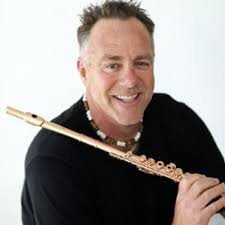La Jolla SummerFest’s “Virtuoso Winds” Flies High
I am not sure what the moniker for this program was intended to communicate, since two of the four pieces performed last Tuesday, August 23, on SummerFest’s “Virtuoso Winds” at the Museum of Contemporary Art San Diego’s Sherwood Auditorium were not for winds. The imaginatively conceived program nonetheless gets mostly distinguished marks for execution.

Verona Quartet: photo courtesy of La Jolla Music Society
The Verona Quartet opened delightfully with a fine performance of Haydn’s String Quartet in B-flat Major, Op. 50, No. 1. The piece marked the composer’s return to the string quartet medium after a lengthy hiatus in which he wrote little new for the genre. The fascinating opus followed few of Haydn’s usual formal structures. It was delivered with delicate perfection by the Verona players, who play and breathe as one, and featured outstanding performances by all. First violinist Jonathan Ong played a 1686 Andreae Guarneri which, unlike the more famous Giuseppe Guarneri (“del Gesu”) instruments, exhibits an intimate and demure tone. The other players matched these qualities beautifully, creating an enviable blend. Although my personal taste in quartet playing favors the more daring, adventurous and “gonzo,” Verona’s reserve, lavishing loving care on the most minute details of the work, left a pleasant impression.
We were treated next to the debut SummerFest presentation of Carl Nielsen’s 1922 Wind Quintet in A Major, Op. 43. The truly bravura performance by five extraordinarily accomplished symphonic players was superb on every level. Nielsen (1865-1931), the slightly quirky Danish composer, wrote this chamber work for his five personal friends in the Copenhagen Wind Quintet, ostensibly featuring musical portraits of each one. Its form is rather eccentric, perhaps reflecting those personalities. Yet, Tuesday’s five crack musicians made it sound as if they played this unpredictable quintet together often, although nothing, of course, could be further from the truth. Almost by definition festival musicians generally fly in from the four corners of the earth and are afforded limited rehearsal time. The exquisite performance by Catherine Ransom Karoly, flute (Los Angeles Philharmonic); Laura Griffiths, oboe (San Francisco Opera): John Bruce Yeh, clarinet (Chicago Symphony); Keith Buncke, bassoon (also of the Chicago Symphony), and Eric Ralske, horn (Metropolitan Opera, substituting for the scheduled Jennifer Montone) was the finest I have ever heard.
It has been said that the wind quintet is the polar opposite of the string quartet in terms of attacks, releases, sustaining sound and phrasing. Thus, from this perspective, by following the Haydn Quartet on the program, the Nielsen was adroitly placed for comparison. Each player exhibited a highly refined, full and sumptuous sound and through their profound skill, blended like a mojito. Intonation was nearly perfect and yet, the incredibly refined playing still allowed for the unique artistic vision and expression of each virtuoso to come out. This was an extremely satisfying performance of a less-than-mainstream work.

Liang Wang: photo courtesy of the artist
Oboist Liang Wang of the New York Philharmonic presented us with Benjamin Britten’s 1951 “Six Metamorphoses for Solo Oboe,” Op. 49, after intermission. Liang’s sound is as penetrating and nearly as loud as a Milwaukee sawzall. The opening of Pan nearly punched a hole through the rear wall of Sherwood. Certainly, a sound as enormous and penetrating as this would serve the oboist well in his day job as an orchestral player and in any case, it was impressive to witness. Yet, Wang’s numerous technical errors were inexcusable for a musician of his caliber.
From the oboist’s extensive biography, it is clear that he is prodigiously gifted and accomplished, making his quotidian performance an unexpected oddity. Certainly, if he played any of the his many successful symphony auditions like he did on Tuesday, he would not have gotten a job. Wang seemed to have difficulty coordinating his fingers and his tongue throughout, he made more outright note errors than would be permitted to any decent conservatory student, and he brought almost no artistic viewpoint to the complex composition. In general, he sounded like he really did not belong on stage playing these “Metamorphoses.” Or. perhaps, he was just having a bad night.

Sheryl Staples: photo courtesy of La Jolla Music Society
Concluding the concert was yet another windless masterpiece, this time Gabriel Fauré’s rather early Piano Quartet in C Minor, Op. 15 from 1879. The string playing of New York Philharmonic members Sheryl Staples, violin; Cynthia Phelps, viola, and Hai-Ye Ni, cello was delightful in every way. Their phrasing and intonation sounded as if they played together all of the time. Oh, wait! They DO play together all the time! Anyway, their tenure in the orchestra seems to have contributed salubriously to their tight ensemble playing.
However, in toto, the performance came out rather schizophrenically. Pianist Shai Wosner seemed like he came out on stage and shook hands with his colleagues for the first time that night. He appeared to be in a different esthetic and time zone, missing notes (gasp!) and generally not finding a sympathetic groove with the strings. The women also struggled to find a common rhythmic conception with Wosner, and yet, when they played without him, it was as if all was well with the world again.

Cynthia Phelps: photo courtesy of La Jolla Music Society
The opening Allegro molto moderato started as a hot mess, but the musicians seemed to straighten things out about half-way through. The Scherzo was similar: horrific ensemble problems at the beginning and then getting things squared away about half-way through. By the time that the musicians got to the Adagio, everyone was, thankfully on the same artistic page. The near-capacity Sherwood crowd was then presented with a gorgeous, rhapsodic interpretation of this delectable treasure. All is well that ends well and the band delivered a nicely squared away Allegro molto to conclude a generally marvelous evening of chamber music.

Yochanan Sebastian Winston, Ph.D. has performed throughout the United States, Europe and Latin America. His repertoire spans classical, jazz, klezmer, new age, contemporary, rock & roll and pop and is very active as a composer. Dr. Winston holds a Ph.D. from the UCSD, a Diplôme from the Conservatoire National de Region de Boulogne-Billancourt (France), and a Master’s and Bachelor’s of Music from the Manhattan School of Music in New York City.


